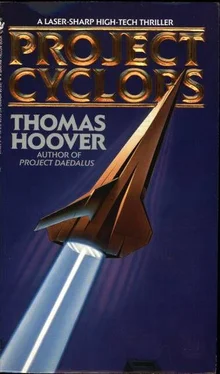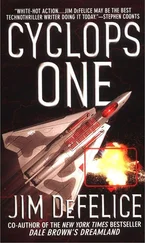Thomas Hoover - Project Cyclops
Здесь есть возможность читать онлайн «Thomas Hoover - Project Cyclops» весь текст электронной книги совершенно бесплатно (целиком полную версию без сокращений). В некоторых случаях можно слушать аудио, скачать через торрент в формате fb2 и присутствует краткое содержание. Жанр: Триллер, на английском языке. Описание произведения, (предисловие) а так же отзывы посетителей доступны на портале библиотеки ЛибКат.
- Название:Project Cyclops
- Автор:
- Жанр:
- Год:неизвестен
- ISBN:нет данных
- Рейтинг книги:4 / 5. Голосов: 1
-
Избранное:Добавить в избранное
- Отзывы:
-
Ваша оценка:
- 80
- 1
- 2
- 3
- 4
- 5
Project Cyclops: краткое содержание, описание и аннотация
Предлагаем к чтению аннотацию, описание, краткое содержание или предисловие (зависит от того, что написал сам автор книги «Project Cyclops»). Если вы не нашли необходимую информацию о книге — напишите в комментариях, мы постараемся отыскать её.
Project Cyclops — читать онлайн бесплатно полную книгу (весь текст) целиком
Ниже представлен текст книги, разбитый по страницам. Система сохранения места последней прочитанной страницы, позволяет с удобством читать онлайн бесплатно книгу «Project Cyclops», без необходимости каждый раз заново искать на чём Вы остановились. Поставьте закладку, и сможете в любой момент перейти на страницу, на которой закончили чтение.
Интервал:
Закладка:
"Apparently the ship was put into place without authorization," Brock went on. "There was some back-channel request from NSA. They wanted to keep tabs on a space project on an island in the Aegean."
"SatCom. Now we're spying on Americans, is that it?" Hansen leaned back in his high, Kevlar-protected chair and tossed a telling glance toward Morton Davies, his chief of staff, who monitored most of his incoming calls. They both had received an earful on the Cyclops project from his old professor, Isaac Mannheim-who claimed it would demonstrate to the world that America's private sector still had plenty of life left, could stand up to the Europeans and the Japanese when it came to innovation. SatCom's independence from government, at least to Mannheim's way of thinking, was precisely its greatest virtue.
"Well, damn NSA," he continued. "This is an outrage."
He recalled that he'd sent the new director, Al Giramonti, a pointedly worded memo on that very subject. When John Hansen took office, the National Security Agency was still liberally exercising its capacity to monitor every phone call in America from its vast array of listening antennas at Fort Meade. He had resolved to terminate the practice. He thought he had.
"It was just routine surveillance," Brock insisted, squirming. He was in his late fifties, bright, with horn-rimmed glasses and a high forehead. He also was black, and he felt he had more than the usual obligation to make his President look good. "There was a satellite test launching in the works. The whole project has been kept under wraps, and NASA wanted to know what was going on. The National Security Agency had a platform in the area, so it all more or less meshed. There was nothing-"
"And what do the Israelis have to say for themselves?" the President pushed on. "The Hind had their markings."
"They deny they had anything to do with it." He squinted toward Hansen, trying to seem knowledgeable yet uncommitted. Which way was the wind going to blow next? "Even though the helo was plainly ID'd by-"
"That's what they claimed in '67," Hansen fumed, cutting him off, "when they strafed, torpedoed, and napalmed NSA's Liberty, which was clearly in international waters. They were hoping to prolong the Six-Day War long enough to roll into Syria, and they didn't want us to monitor their plans. So they took careful pains to knock out all our SIGINT capability in the region, just happening to kill a dozen seamen in the process. Afterwards the lying fuckers told our embassy in Tel Aviv it was all a mistake and sent flowers. If anybody else in the world had done that, we'd have nuked them."
"Well, at the time the Glover was hit, it wasn't monitoring Israeli SIGINT," Brock noted, adjusting his glasses. "We think they're clean on this one. At least what we have from Fort Meade so far seems to bear that out. They're still running a computer analysis, though, pulling out all the voice and code used by the Israeli Air Force during that time. We didn't have that capability back in 1967. In a few more hours we'll be able to put that question to rest, one way or another."
"Okay, maybe we should go slow till then. So in the meantime, let's take them at their word for a moment and examine the other possibilities." Hansen revolved in his chair and stared out the bulletproof window behind him. The Washington sky was growing overcast. And the clock was running. This whole screw-up would be in tomorrow's Washington Post, garbled, just as sure as the sun was going to come up. CNN had already picked up the BBC's "rumor" and was running it on their "Headline" service, hinting the U.S. intelligence community had been caught with its pants around its ankles, again.
"There's more," Brock said, interrupting his thoughts. "The Iranians have been screaming about a stolen Hind for four days, blaming us, of course. But they've quietly let Mossad know they think it may have strayed into Pakistan, maybe as a diversion, and then ended up heading out for one of the Gulf states, probably Yemen. The Israelis have reason to believe it was delivered to a Yemeni-flagged freighter in the Persian Gulf, then taken through the Suez Canal and into the eastern Med. After that, all contact was lost."
Iran, the President thought. Pakistan. None of it sorted into a picture. Unless…
"Incidentally," Morton Davies, Chief of Staff, interjected, "the Israelis also have one other bit of intel that seems to have somehow gotten lost in all of NSA's Cray supercomputers. An Israeli 'fishing trawler' picked up a Mayday they triangulated as coming from somewhere north of Crete. It supposedly claimed-the transmission was a bit garbled-to emanate from the very Hind that had attacked the ship. The broadcast said that terrorists had taken over the SatCom facility on the island of Andikythera. If that's true, it would be the one that the Glover was monitoring."
Hansen stared at him. "Are we supposed to believe any of this? That unknown terrorists are behind this whole thing? That's exactly the kind of disinformation the Israelis have used on us in the past. Besides, it doesn't click. If terrorists did do it, they'd damned sure want the credit. Nobody throws a rock this size through your window unless there's a note attached. So where is it?"
That's when the import of what Davies had said hit him. SatCom. It was going to be the pride of America, a symbol… My God, it was a rocket launch facility.
He reached down and touched the blue button on the desk intercom on the right side of his desk.
"Alicia."
"Sir," came back the crisp reply.
"Have NSA send over any recent PHOTOINT they have on the Greek island of Andikythera. By hand. I want it yesterday."
"Yes, sir."
"Ted," he said, turning back to Brock, "somehow this time I've got an uncomfortable feeling the medium may be the message."
1:49 P.M.
"To understand the operation of this facility," Isaac Mannheim was saying, "you need to appreciate the technology we've installed here." He was resting against the trunk of a tree, gazing wearily down the mountain at the sun-baked asphalt of the facility stretching below.
"I've already got a rough idea how it works," Vance replied. He was pondering the quiet down below. "It's the people I want to know more about."
"Well, of course, that's my primary concern as well." The old man shrugged. "But we are on the verge of an experiment that will change the world for all time. That's just as important."
"Not in my book."
"Perhaps. But all the same, I think I should tell you a few technical details about the facility. Since you say you're familiar with its general workings, you probably know that its heart is a twenty-gigawatt laser we call the Cyclops. Using it, we can send a high-energy beam hundreds of miles into space without losing appreciable energy. Our plan is to use that beam of energy, which we can direct very accurately, to power a satellite launch vehicle."
"I understand that."
"Excellent," he said, as though encouraging a student. Then he pushed on. "In any case, the Cyclops itself is a repetitive-pulsed, free-electron laser, which means the computer can tune it continuously to the most energy-efficient wavelength, a crucial feature. It starts with an intense beam of electrons which it accelerates to high velocity, then passes through an array of magnets we call the 'wiggler.' Those magnets are arranged in a line but they alternate in polarity, which causes the electrons passing through to experience rapid variations in magnetic-field strength and direction. What happens is, the alternating magnetic field 'wiggles' the beam of electrons into a wave, causing them to emit a microwave pulse-which is itself then passed back and forth, gaining strength at every pass. Eventually it saturates at a level nearly equal to the power of Grand Coulee Dam, and then-"
Читать дальшеИнтервал:
Закладка:
Похожие книги на «Project Cyclops»
Представляем Вашему вниманию похожие книги на «Project Cyclops» списком для выбора. Мы отобрали схожую по названию и смыслу литературу в надежде предоставить читателям больше вариантов отыскать новые, интересные, ещё непрочитанные произведения.
Обсуждение, отзывы о книге «Project Cyclops» и просто собственные мнения читателей. Оставьте ваши комментарии, напишите, что Вы думаете о произведении, его смысле или главных героях. Укажите что конкретно понравилось, а что нет, и почему Вы так считаете.












